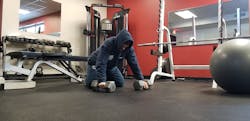One of the biggest things that keep people from improving their health and level of fitness is their tendency to overdo. Instead of making small, sustainable lifestyle changes, they undertake seven-day challenges, fad diets and ridiculous workouts. The problem with this approach is that, although these things might work in the beginning, they’re impossible to stick to, because they aren’t realistic.
To improve your health and to stay healthy for your career, you must create habits that lead to positive results. The focus should be on making small lifestyle changes that you can build on. When I coach first responders, I like to explain that we all must build habits that make us SMART. Of course, the fire service loves acronyms; here, smart stands for sleep, move, agua (water), real foods and tenacity.
It doesn’t matter your goal: weight loss, strength gain, improved performance or general health. Habits that make you SMART will help you to get there.
Habit No. 1: Sleep
Sleep is the foundation for optimal health. More than 5,000 studies show that sleeping fewer than seven hours per night is associated with adverse health outcomes, such as weight gain, obesity, diabetes, hypertension, heart disease, stroke, depression and cancer. Sleeping fewer than seven hours per night also is associated with impaired immune function, an increase in the level of pain, impaired performance, an increase in errors and greater risk of accidents.
As first responders, we work long shifts and have little control over call volume and sleep. I am not advising that we do away with traditional schedules … yet. However, if you want to improve your overall health and avoid spending your retirement with one or more chronic diseases, here are some habits that you must implement when it comes to sleep:
- Get 7–8 hours of sleep on your off days to help to combat the negative effects of poor sleep on duty
- Go to sleep at the same time and wake up at the same time every day
- Turn off electronic devices at least 30 minutes before bedtime; the blue light that’s emitted by your cellphone screen restrains the production of melatonin, which is the hormone that controls your sleep-wake cycle, aka circadian rhythm
Habit No. 2: Move
Regular physical activity plays an important role in maintaining healthy body weight, promoting good health and performing on the fireground. The more that we move, the more muscles that are used, and the more calories that are burned. Finding ways to be more active during the day has numerous health benefits, including improved mood and cognitive function.
Being more active throughout the day is only part of the equation. As a first responder, it’s imperative that you maintain your strength and stamina to be able to perform the demanded tasks. Consistent and functional workouts are one of the best ways to reduce injury and improve performance.
If you are just coming from “the leathers”—meaning that you haven’t been very active recently—start with easy workouts. Focus on improving mobility and perform bodyweight movements to improve strength. Try to include some cardiovascular exercise in weekly workouts. Don’t go back to your old high school workout programs and think that you “still got it.”
Trust me, as a firefighter, EMT and/or medic, you must train more functionally for the job. The term “functional” is thrown around a lot these days. For you and me, it means integrating exercises that help us to move and perform better on the rescue scene and off of it.
Further, workouts don’t need to last hours and always be intense. They just need to incorporate the right components and be consistent.
Here are some habits that you must implement when it comes to moving:
- Functional exercise at least three times per week (at least 30 minutes)
- Get at least 8,000 steps per day
- Perform at least one 30-second stretch every day
Habit No. 3: Agua (drink water)
Admittedly, my Spanish inflection was needed to keep the acronym solid. That said, regardless of whether you call it agua or water, drinking enough can dramatically improve your health. Furthermore, out of all of the habits that are listed in this column, this is the easiest to build.
Your body depends on water to survive. Every cell, tissue and organ in your body needs water to work properly. Your body needs water to maintain temperature, remove waste and lubricate joints.
Hydration is critical for optimal performance. Progressive dehydration from exercise (or fireground operations) impairs performance, mental capacity and perception of effort and can be life-threatening. With as little as a 2 percent body water shortage, the ability to perform high-intensity activity can be impaired greatly. Drinking enough water also can lead to more energy and a decrease in hunger pangs, because they often are an indicator of a lack of hydration rather than of food.
Here are some habits that you must implement when it comes to consuming water:
- Drink at least 64 ounces per day, with a target of one-half your body weight in ounces
- Don’t rely on thirst; drink before, during and after your shift
- Carry a water bottle on the apparatus and around the station
Habit No. 4: Real foods
Food is fuel. It feeds our cells, brain and muscles and greatly affects how we feel, think and move.
If you put subpar gasoline in the tank of your emergency vehicles, you get subpar performance from them. The same is true regarding subpar food and the human body. Eating real foods reduces your risk of heart disease, diabetes, stroke and cancer. Real foods provide our body with the nourishment that’s necessary to maintain a healthful, active life.
What are real foods? Simply put, they’re foods that come from the earth and can be traced back easily to their origin. Real foods are fruits, vegetables, beans, whole grains, nuts, seeds, dairy, eggs, meat, fish and poultry—items that everyone’s grandparents would recognize and ate as staples in their family’s meals.
Processed foods, although convenient, can leave us feeling unsatisfied and constantly searching for something that fills that need. Food that are heavily processed often include unhealthful levels of sugar, sodium and fat. They also include chemicals and preservatives that can lead to serious health issues and can affect mood and energy levels.
Habits that you must implement when it comes to consuming real foods:
- Shop the edges of the grocery store; all of the fresh foods typically are found on the outside aisles; the highly processed foods typically are on the middle shelves
- Look for foods that have five ingredients or fewer
- Try to eat at least five portions of a variety of fruits and vegetables every day
Habit No. 5: Tenacity
Tenacity is the mental strength to resist opposition. It’s the quality of staying determined and persevering when the going gets tough and sticking to a project, task or deadline. According to the dictionary, tenacity means “to grip something firmly” and “being very determined.” When you develop tenacity, you continue doing what’s required to get the outcome that you want, particularly when things get difficult.
Tenacity doesn’t come naturally. You can build tenacity like you can build muscle. Further, just like building muscle, building tenacity takes work and consistency. It’s the final component of the SMART formula and brings everything together to ensure that you follow through with the other habits.
Tenacity habits include:
- Surround yourself with people who will support and challenge you
- Find your “why”—What are your reasons for wanting to get healthy?—and write it down
- Take action every day
Determination
At the end of the day, it boils down to decisions and actions that your future self would want to high-five. Don’t wait until you are injured or sick to improve your health. Focus on creating habits that improve your sleep, find ways to move more and train functionally, make sure that you hydrate daily with water, eat real foods and take steps to be more tenacious when it comes to your health. Your crew, your family and your community are counting on you.
Aaron Zamzow will present “Improving Fireground Performance and Resilience” and “Heathy You = Healthy Crew: How to Create a Fit and Healthy Culture” at Firehouse Expo. To register, visit firehouseexpo.com.






